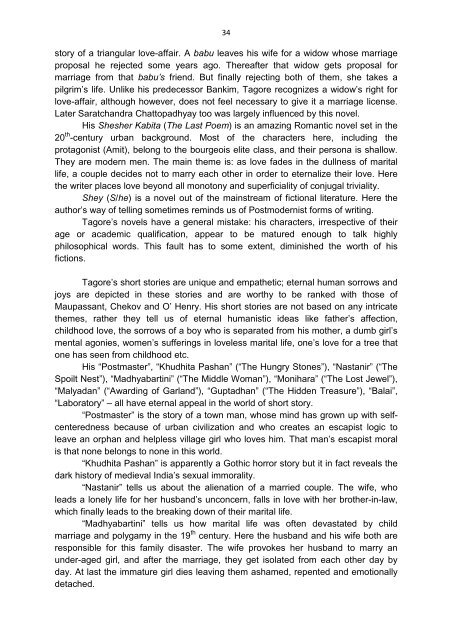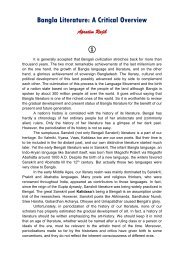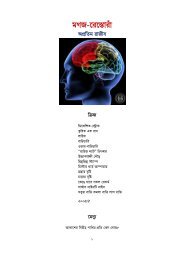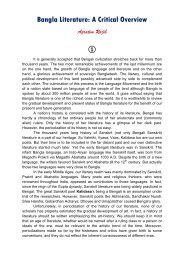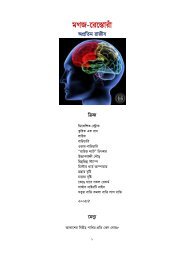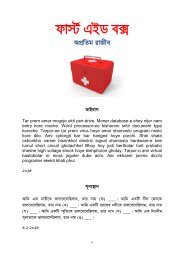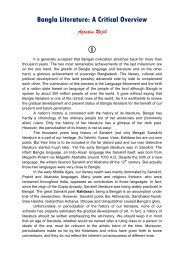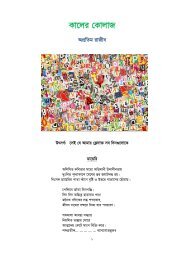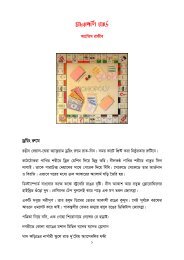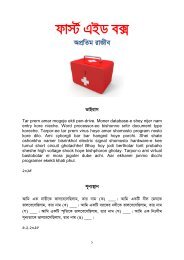Literature-Critique
Create successful ePaper yourself
Turn your PDF publications into a flip-book with our unique Google optimized e-Paper software.
34<br />
story of a triangular love-affair. A babu leaves his wife for a widow whose marriage<br />
proposal he rejected some years ago. Thereafter that widow gets proposal for<br />
marriage from that babu’s friend. But finally rejecting both of them, she takes a<br />
pilgrim’s life. Unlike his predecessor Bankim, Tagore recognizes a widow’s right for<br />
love-affair, although however, does not feel necessary to give it a marriage license.<br />
Later Saratchandra Chattopadhyay too was largely influenced by this novel.<br />
His Shesher Kabita (The Last Poem) is an amazing Romantic novel set in the<br />
20 th -century urban background. Most of the characters here, including the<br />
protagonist (Amit), belong to the bourgeois elite class, and their persona is shallow.<br />
They are modern men. The main theme is: as love fades in the dullness of marital<br />
life, a couple decides not to marry each other in order to eternalize their love. Here<br />
the writer places love beyond all monotony and superficiality of conjugal triviality.<br />
Shey (S/he) is a novel out of the mainstream of fictional literature. Here the<br />
author’s way of telling sometimes reminds us of Postmodernist forms of writing.<br />
Tagore’s novels have a general mistake: his characters, irrespective of their<br />
age or academic qualification, appear to be matured enough to talk highly<br />
philosophical words. This fault has to some extent, diminished the worth of his<br />
fictions.<br />
Tagore’s short stories are unique and empathetic; eternal human sorrows and<br />
joys are depicted in these stories and are worthy to be ranked with those of<br />
Maupassant, Chekov and O’ Henry. His short stories are not based on any intricate<br />
themes, rather they tell us of eternal humanistic ideas like father’s affection,<br />
childhood love, the sorrows of a boy who is separated from his mother, a dumb girl’s<br />
mental agonies, women’s sufferings in loveless marital life, one’s love for a tree that<br />
one has seen from childhood etc.<br />
His “Postmaster”, “Khudhita Pashan” (“The Hungry Stones”), “Nastanir” (“The<br />
Spoilt Nest”), “Madhyabartini” (“The Middle Woman”), “Monihara” (“The Lost Jewel”),<br />
“Malyadan” (“Awarding of Garland”), “Guptadhan” (“The Hidden Treasure”), “Balai”,<br />
“Laboratory” – all have eternal appeal in the world of short story.<br />
“Postmaster” is the story of a town man, whose mind has grown up with selfcenteredness<br />
because of urban civilization and who creates an escapist logic to<br />
leave an orphan and helpless village girl who loves him. That man’s escapist moral<br />
is that none belongs to none in this world.<br />
“Khudhita Pashan” is apparently a Gothic horror story but it in fact reveals the<br />
dark history of medieval India’s sexual immorality.<br />
“Nastanir” tells us about the alienation of a married couple. The wife, who<br />
leads a lonely life for her husband’s unconcern, falls in love with her brother-in-law,<br />
which finally leads to the breaking down of their marital life.<br />
“Madhyabartini” tells us how marital life was often devastated by child<br />
marriage and polygamy in the 19 th century. Here the husband and his wife both are<br />
responsible for this family disaster. The wife provokes her husband to marry an<br />
under-aged girl, and after the marriage, they get isolated from each other day by<br />
day. At last the immature girl dies leaving them ashamed, repented and emotionally<br />
detached.


